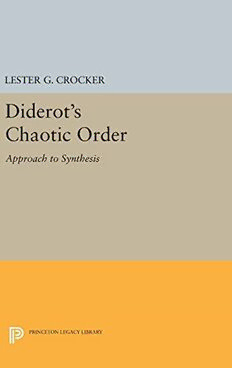
Diderot’s Chaotic Order: Approach to Synthesis PDF
Preview Diderot’s Chaotic Order: Approach to Synthesis
Diderot's Chaotic Order Lester Q. Crocker Diderot's Chaotic Order Approach to Synthesis Princeton University Press 1974 Copyright © 1974 by Princeton University Press Published by Princeton University Press Princeton and London All Rights Reserved LCC: 73-22127 ISBN: 0-691-07199-3 Library of Congress Cataloging in Publication Data will be found on the last printed page of this book Publication of this book has been aided by the Whitney Darrow Publication Reserve Fund of Princeton University Press This book has been composed in Linotype Baskerville Printed in the United States of America by Princeton University Press Princeton, New Jersey for Billie, and for Roger, Leslie and Fred Sunt lacrymae rerum et mentem mortalia tangunt Contents Preface ix I. Cosmic Order 3 II. Aesthetics 52 III. Morals 75 IV. Politics 116 Conclusion 150 Bib liography é çï Index 175 Preface O RDER AND DISORDER ARE FUNDAMEN- tal categories of our experience and our modes of thought. Whether they are subjective ms rof of appre hending and interpreting experience or perceptions of objective relationships is not sy ae to decide. They un doubtedly have ve itceffa ts cepsa and are related to our security and our needs. However, although ideas of good order, or even of order f, lesti are quite variable, there are surely objective correlatives of these ideas, or f in stance in physical and al icos phenomena. No one—to take extreme examples—would consider a destructive hurricane or a war to be ms rof of order. et Y one could argue that the one is intrinsic to the physical ws al of what is called "the natural order," and that war, like revolution, is so la a violent ss ecorp of replacing one order by another, conceivably a better one. This is the inescapable ambiguity that makes the subject lt uciffid to deal with, both or f the philosopher and or f the scholar who es hsiw to understand the philosopher. The ancient Hebrews were probably more impressed by ic msoc disorder than by order. eh whaY as w a God of justice, and he as w intended to be an ordering principle; but the ok oB of Job reveals a deep appre- hensiveness on the part of thinking men in a d-oG centered culture. Even if God had created an orderly world, there as w no doubt that men were constantly IX
